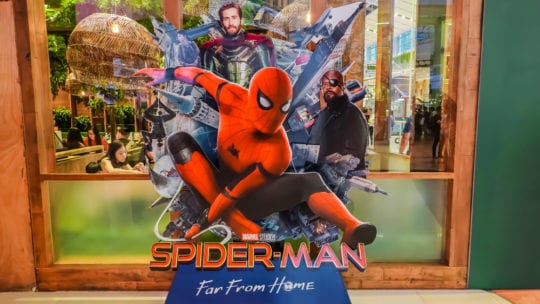
What a tangled web the Spider-Man film rights weave.
Though Disney's Marvel Studios owns the film rights to all Marvel characters (including X-Men and Fantastic Four after purchasing 20th-Century Fox), Sony owns the film rights to Spider-Man and all characters affiliated with the web-slinger.
Marvel Studios was able to include Spider-Man in several films over the last several years, however, due to a deal with Sony that saw Sony finance the films and have "final creative control," while Marvel Studios head Kevin Feige produced and served as creative lead. This resulted in five Spider-Man films for the Marvel Cinematic Universe (MCU), including two solo films, that audiences and critics alike agreed were the best on-screen iterations of the character yet.
Then last week, multiple reports came in that Sony and Marvel were unable to broker a new deal to keep Spidey in the MCU. Early reports claimed that negotiations fell apart after Disney refused to accept anything less than a 50-50 co-financing split for revenue from future Spider-Man films (later reports claimed they only wanted 30 percent of revenue).
Sony issued a statement that seemed to suggest the deal fell apart because of Disney. "Much of today's news about Spider-Man has mischaracterized recent discussions about Kevin Feige's involvement in the franchise," a spokesperson said. "We are disappointed, but respect Disney's decision not to have him continue as a lead producer of our next live action Spider-Man film."
This left Disney in a precarious position, as its biennial D23 Expo was about to take place in Anaheim, California last weekend, when The House of Mouse announces many exciting bits about the future of its films, theme parks, and more. How would it address the giant radioactive spider in the room?
By taking the high road, of course. From leveraging fan affection to communicating gratitude in the face of uncertainty, Marvel's handling the uncertainty of its film future with Spider-Man was a masterclass in how to delicately say "I don't know" to your stakeholders. Whether on quarterly earnings calls or organizational restructuring meetings, communicators should take note of Marvel's skills for the times when we need to navigate uncertain waters with our own teams.
When audience sentiment is on your side, let brand advocates speak on your behalf
Fans of Marvel's most popular superhero were quick to place the blame on Sony for not agreeing to Marvel's terms and re-negotiating. Many pointed out how much this decision would not only hurt the future of the franchise, but Sony's bottom line. The trending hashtags #SaveSpidey, #SpiderManBelongsInTheMCU and #SaveSpiderManFromSony said more about audience sentiment around this news after it broke than a statement from Marvel ever could have.
"Disney has the advantage of having public support on its side through MCU fans, because there is no real 'other side' in this situation in terms of fandom," wrote Paul Tassi for Forbes. "[T]here is no substantive other side here for fans...there is only the MCU side, which has spent more than 10 years building itself up as a pop culture force that has probably even surpassed Star Wars at this point, given the number of films and continued cultural relevance."
Thus, while the earned media takedowns of Sony kept coming, Marvel stayed silent. After all, they had their huge D23 Expo coming up that weekend. Fans and media alike waited patiently to see how Disney would address the Marvel-Sony conflict at its flagship promotional event.
Gratitude is more powerful than uncertainty
The answer came backstage at D23 in an Entertainment Weekly exclusive interview with Feige and Tom Holland, who plays Spider-Man. Holland, who is still on contract for more films with Sony either way, acknowledged that Spider-Man's future in the MCU was still uncertain. But it was his humble gratitude that spoke louder.
"Who knows what the future holds?" Holland told EW. "But all I know is that I’m going to continue playing Spider-Man and having the time of my life. It’s going to be so fun, however we choose to do it. The future for Spider-Man will be different, but it will be equally as awesome and amazing, and we’ll find new ways to make it even cooler.” He also briefly spoke to the crowd, echoing his gratitude.
“I’m feeling about Spider-Man gratitude and joy,” Feige told EW. “It was a dream that I never thought would happen. It was never meant to last forever. We knew there was a finite amount of time that we’d be able to do this, and we told the story we wanted to tell, and I’ll always be thankful for that.”
Not only did this keep the mood up as the interview made the rounds, but it made Disney/Marvel out to be taking the high road in contrast to Sony's more finger-pointing statement. Communicators should never be afraid to say, "I don't know, we'll find out together," when a situation arises that they should not assume sole responsibility for. If your brand or organization is not the perpetrator of a crisis that has befallen you, acknowledging your stakeholder's feelings and reinforcing your emotional connection to them is enough.
As of this writing, there is still a chance that Sony and Marvel could broker a deal. Whatever the outcome, Marvel showed that by letting its fans speak loudly, staying humble and owning up to what they did not know, their spidey-sense for good PR still tingles.
